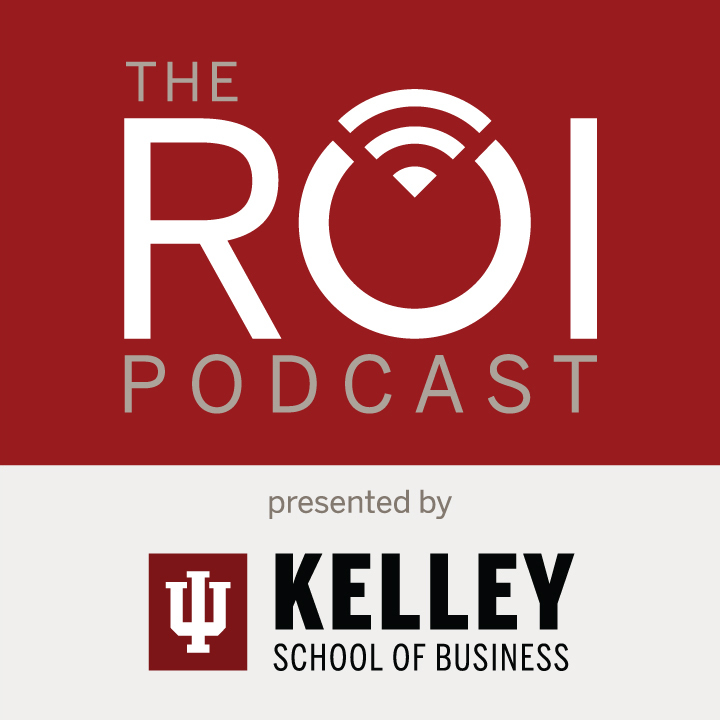
The ROI Podcast provides professionals from all industries with actionable insight from world-renowned faculty members at Indiana University's Kelley School of Business. Learn not only from award-winning faculty but business experts who are disrupting their respective industries. The ROI Podcast equips you and your organization with the knowledge to keep a competitive edge over the competition.
Episodes

Monday Mar 05, 2018
How this CEO grew her business in a volatile economy | Ep. 40
Monday Mar 05, 2018
Monday Mar 05, 2018
There are certain principles that, once applied, can cause massive growth within a business. Barb Cutillo, co-founder of Stonegate Mortgage, shares the principles that grew her business exponentially during one of the most volatile times in the United States.
----
Do you have a question? Looking to get help on a business decision? Know a great guest for our show? Email roipod@iupui.edu so we can help your organization make better business decisions.
----
Ready to take your next step? Check out if a Kelley MBA is right for you: https://bit.ly/3m2G6D5
----
Show Notes:
Shane: What’s going on everyone! Welcome to another episode of The ROI Podcast Presented by The Kelley School of Business on the IUPUI Campus in downtown Indianapolis. We are continuing on with our CEO series and today we’re going to talk to someone who, in the midst of a time when businesses were shutting down faster than they could blink, built a powerful company that continues to prosper. We’re talking about Barb Cutillo, a Kelley School of Business MBA and co-founder of Stonegate – a mortgage business that thrived while others had to close their doors… But before we get into that, let’s take you back to 2007…
(Clock ticking sounds)
Shane: It was the end of 2007 and the clock was ticking… 2008 and half of 2009 would be one of the worst recessions in United States history… Businesses were closing, people were losing their jobs, their homes, and their entire lives… The economy crashed.
(Economic crash soundbite compilation)
Barb: It was challenging because there was an online website that was like an implosion meter that showed all the companies going out of business!
Shane: Barb Cutillo, who built their entire business on home loans, remembers it well.
Barb: The market was imploding, home values were dropping, it was scary for a lot of people because they were losing jobs and unable to make mortgage payments.
Shane: So what a time to have a new business in the mortgage world. If you look at the circumstances, you could really say the odds were against Stonegate. But when the economy is down, and most other businesses are, too – that’s when Barb saw an opportunity to grow.
Barb: We had a couple great things on our side, which was we had lenders that worked with us to keep our access to funds available, so they didn’t shut us down - they knew that the loans we were underwriting were quality, so they believed in us, and now we had an opportunity to recruit good salespeople because a lot of them had been let go, and good back-office people.
Barb: When the market was down, we were actually hiring, and these people were now available to us to grow our business!
Shane: And Barb says if it weren’t for that recession we felt here in the United States – Stonegate wouldn’t have grown to the level it did. So that makes you wonder – how? How did they thrive in such a tough economic time? And how can you push you or your company to the point where you can grow, when others are stagnant?
Barb: It is a daunting situation and I’ve counseled and mentored several companies. We lived it at Stonegate and now that I’m on the other side - an investor, coach, and mentor – I’ve seen a lot of companies struggle with this: how do you get in front of the right people, how do you grow your business? The mortgage product itself was something that there was demand for, so it’s a little bit different than a brand new app or widget. But then again, there’s a lot more competition because people can get mortgaged everywhere!
Shane: So that’ a strong tip for anyone in business… Ask yourself: Who is the exact kind of person your product or service would benefit? Create a customer avatar – and make it very detailed about the ideal customer. Second: figure out how you can scale your business with this particular demographic or demographics. But for Barb’s industry – she was in what some would call a red ocean, or a saturated market because there are so many mortgage companies.
Barb: Exactly, it is. You have to differentiate yourself, and I think it comes down to, and I hate to say this, but you have to spend money to make money. We had to hire a few key, manager-type salespeople that had contacts - even the executives at our company had to sell our services. We had to be able to sell ourselves first – if we can’t sell ourselves and what we’re providing to a few, key employees and customers. We also gave equity – I know a lot of CEOs of small companies are afraid to give away any equity, but you know what, if you really want people on your team, you’re going to have to give a little bit to get more. We always had that philosophy of you’d rather have a little bit of a lot than a lot of a little.
Shane: So hiring the right people is obviously critical, and Barb will be the first to tell you that was instrumental in Stonegate’s success.
Barb: In order to attract those great, talented people that you need on your team, we felt like we needed to promote culture. Sure, we could say, “Here’s your offer, x number of dollars” but dollars aren’t necessarily all that drive people anymore – it’s about culture, the whole package. When we made offers to people to come on board, I came right out and said, “I’m not just giving you a paycheck, this is a place for you to learn, grow, and give back”.
Barb: We knew people were important and that was what was going to take us to the next level. We had once-a-month Friday gatherings for people to come at4 pm and have a beer in the training room, we always had company picnics, tried to have holiday gatherings at the larger locations, etc. In our handbook, from day one, our PTO policy had a section at the very end that talks about our “compassionate PTO policy” – if your co-worker had a sick parent, and they needed extra time, you could donate some PTO to them!
Shane: Creating a company culture that could weather any storm that may arise in the marketplace was key, Barb says. From letting her employees work from home at times, to allowing them to donate their PTO to other employees – it was a culture that everyone felt connected in and also made them feel invested in the company’s success. Now, this final strategy that Barb shared was incredible – and it was implemented after an employer survey that came back with some negative feedback about some of the managers.
Barb: Rather than firing a bunch of people and pointing fingers, what can we do about this, and what needs to be done? A lot of these people that were put in management positions, frankly, weren’t ready or trained – they didn’t have the knowledge! We thought about putting together a management training program so we can have a little boot camp to bring people to speed, level the playing field for our managers and supervisors, and see what happens. I was in charge of the HR area, so myself, my HR Director, and Training & Development guy sat together and sketched out what they would look like. We didn’t recreate the wheel, we took on Covey principles, used some of the Disney best practices, and we put together a management training package with follow-up coaching, mentoring, and with outside people. We ran a group of 100 managers or so through it in the course of a year, and the impact that had on the organization was enormous. Employee engagement scores went up by 30% in one year because people were excited to go to work again – they knew what the goals of the company were, they loved their managers, the managers listened to them and met with them on a regular basis. If you think about it, how come that wasn’t happening? But people didn’t know about it - once they know, then they do better.
(Closing Music)
Shane: Provide the support, training and LISTEN to your audience. Whether that’s your customers or your own employees. These strategies allowed Stonegate Mortgage to grow into the multi-million dollar company it is today. And here’s one final thought for you:
(The ROI Podcast Music)
Shane: If you’re in business, the principles that Barb shared with us is a winning formula for growth and success. It all comes down to treating your employees right, which carries over in how they treat your customers. It’s a chain reaction of respect – and when consistently implemented – you’ll be amazed at what your team can accomplish. And that’s going to do it for episode 40 of The ROI Podcast. A big shout out to Barb Cutillo for sharing her insight. Now go out there and implement! But before you do, head over to Itunes and Subscribe and Leave a review to The ROI Podcast. Let us know what you think – that helps us out in a major way. Other than that – we’ll be back here next week with another CEO series episode!

Comments (0)
To leave or reply to comments, please download free Podbean or
No Comments
To leave or reply to comments,
please download free Podbean App.